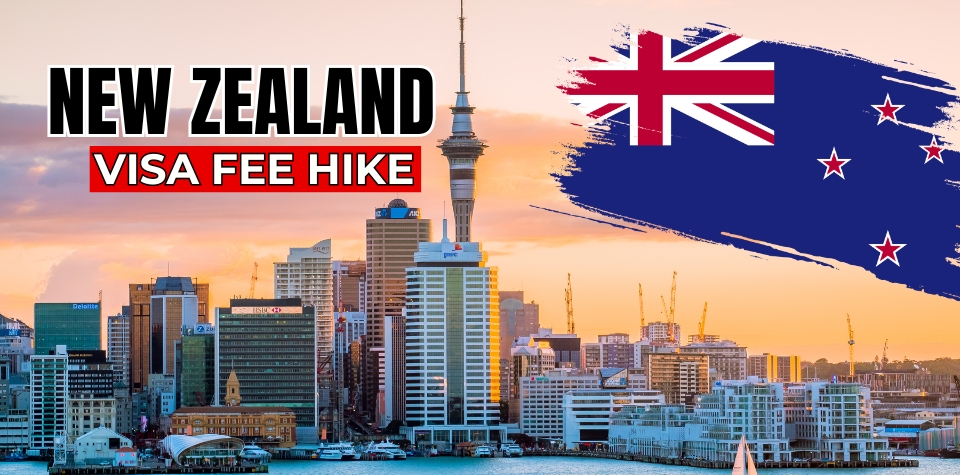New Zealand Visa Fee Hike

New Zealand Visa Fee Hike
New Zealand has long been a popular destination for international students seeking high-quality education and a vibrant cultural experience. However, recent changes to visa fees have raised concerns among students and educational consultants alike. This blog post will break down the details of the visa fee hike and explore how it impacts international students planning to study in New Zealand.
Understanding the New Visa Fees
The New Zealand government has announced an increase in visa fees for international students. This change affects all categories of student visas, making it more expensive for students to apply for and renew their visas.
Why the Increase?
The New Zealand government cites rising operational costs as the primary reason for the fee hike. With more international students applying for visas, the administration and processing expenses have increased. This fee adjustment aims to cover these additional costs while ensuring the visa processing system remains efficient.
Who is Affected?
The fee increase impacts all international students applying for visas to study in New Zealand. Whether you’re a new applicant or renewing your existing visa, you’ll need to budget for the higher fees.
Affected Groups:
- First-time Applicants: Students applying for a visa for the first time will see an increase in their application fees. This includes those enrolling in undergraduate, postgraduate, and vocational courses.
- Returning Students: Those who need to renew their visas will also face higher fees. This could impact students planning to extend their stay for further studies or post-study work opportunities.
- Dependents: If you plan to bring family members with you, their visa fees will also see a hike.
Financial Implications for Students
The fee hike adds an extra financial burden on students. For many, the cost of education in New Zealand is already high, and this increase could strain budgets further. It’s crucial for students and their families to account for these additional expenses when planning to study in New Zealand.
Budgeting Tips for Students:
- Factor in Visa Costs Early: When planning your finances, include the visa fee as a significant part of your budget. This way, you won’t be caught off guard by the increase.
- Look for Scholarships: Explore scholarships and financial aid options to help offset the rising costs. Many universities offer financial support to international students.
- Consider Part-Time Work: New Zealand allows international students to work part-time during their studies. This can help cover living expenses and visa fees.
Impact on New Zealand’s Attractiveness as a Study Destination
While New Zealand remains an attractive study destination, the visa fee hike may lead some students to reconsider their options. Other countries with more affordable visa processes might become more appealing.
Comparing Costs:
- Australia: New Zealand’s neighbor offers competitive education options and may seem more attractive with lower visa fees.
- Canada: With a reputation for quality education and reasonable visa fees, Canada might lure students away from New Zealand.
- UK: Although known for higher tuition fees, the UK offers streamlined visa processes that might offset the overall costs for some students.
Educational Institutions’ Responses
New Zealand’s universities and colleges have expressed concern about the potential impact of the visa fee hike on international student enrollment. Many institutions rely on international students for a significant portion of their revenue, and a drop in enrollment could have far-reaching effects.
University Responses:
Some universities are advocating for additional financial support for students to counterbalance the fee hike. Others are ramping up their marketing efforts to highlight the unique benefits of studying in New Zealand, hoping to retain their competitive edge.
Conclusion
The New Zealand visa fee hike is a significant development that international students must be aware of. While it adds to the financial burden of studying in the country, careful planning and budgeting can help mitigate its impact. For those still considering New Zealand as a study destination, the country’s world-class education and stunning natural landscapes continue to make it a worthwhile choice.
Tuition Costs to Consider:
- A 2-year program in New Zealand would cost NZ$1,500.
- A 3-year bachelor’s degree would cost NZ$2,250.
- A 4-year bachelor’s degree would cost NZ$3,000.
If you’re planning to study in New Zealand, staying informed about such changes is crucial. At Blue Horse Education, we keep you updated on all the latest visa news and provide expert guidance to ensure your study abroad journey is as smooth as possible.
QUICK LINKS
OUR SERVICES

















